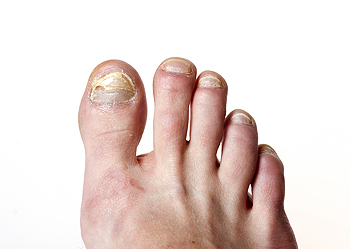NJ (908) 688-5577
NY (212) 737-2528

Onychomycosis is the medical term for toenail fungus. While different organisms may be responsible for the infection, dermatophytes are the most common culprits by far. Toenail fungus is a bothersome condition that causes the nails to become discolored, thickened, distorted, ragged, crumbly, brittle, and even smelly in certain cases. Older adults are more prone to contracting a toenail infection because as we age, our nails become more brittle. Brittle nails can crack, which can make it easier for the fungal organism to creep inside the nail and infect it. If you detect any of the symptoms mentioned here, it is advised to seek the care of a podiatrist. Toenail infections can be very difficult to treat at home, given that the organism can burrow deep into the multiple layers of the nail or underneath the nail, making it difficult to target and kill effectively and permanently. Also, home treatment may be risky for people with weakened immune symptoms, diabetes, or circulatory issues.
If left untreated, toenail fungus may spread to other toenails, skin, or even fingernails. If you suspect you have toenail fungus it is important to seek treatment right away. For more information about treatment, contact Glenn Davison, DPM of Advanced Podiatry. Our doctor can provide the care you need to keep you pain-free and on your feet.
Symptoms
Treatment
If self-care strategies and over-the-counter medications does not help your fungus, your podiatrist may give you a prescription drug instead. Even if you find relief from your toenail fungus symptoms, you may experience a repeat infection in the future.
Prevention
In order to prevent getting toenail fungus in the future, you should always make sure to wash your feet with soap and water. After washing, it is important to dry your feet thoroughly especially in between the toes. When trimming your toenails, be sure to trim straight across instead of in a rounded shape. It is crucial not to cover up discolored nails with nail polish because that will prevent your nail from being able to “breathe”.
In some cases, surgical procedure may be needed to remove the toenail fungus. Consult with your podiatrist about the best treatment options for your case of toenail fungus.
If you have any questions, please feel free to contact our offices located in Union, NJ and New York . We offer the newest diagnostic and treatment technologies for all your foot care needs.